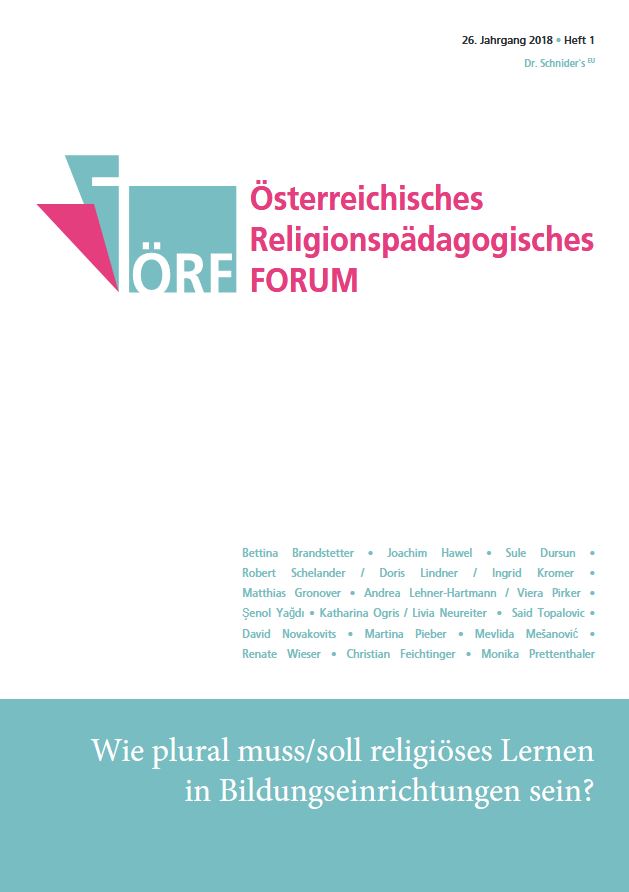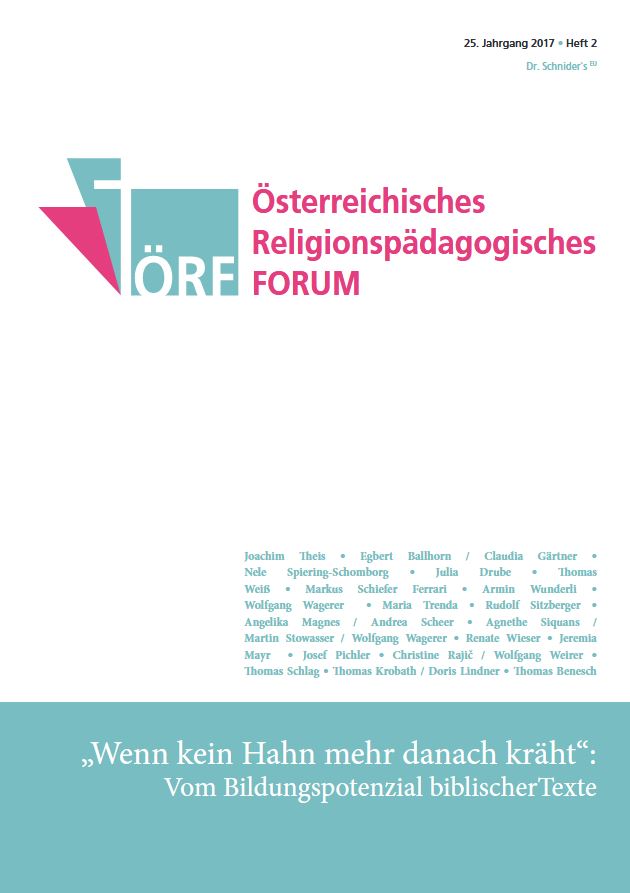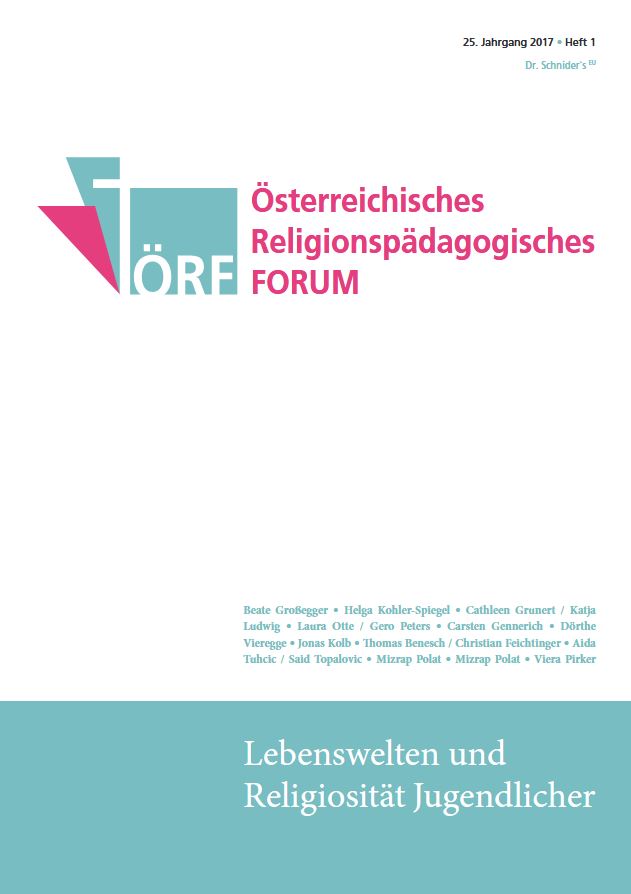Archives
-
Democratic Education
Vol. 33 No. 2 (2025) -
Rassismus als Ideologie: Konturen einer rassismuskritischen Religionspädagogik
Vol. 33 No. 1 (2025)From this complex constellation, this issue aims to focus attention on the ideology of racism and the efforts of religious education that is critical of racism, which has taken shape in recent years. In the context of the aforementioned awareness, greater attention is being paid, for example, to racist attribution and exclusion processes and Christian entanglements with racism. A central concern here is to develop ways of thinking that are critical of racism in the context of religious education by analysing different aspects (e.g. religious didactics or educational theory). Although these questions are analysed from a variety of theoretical perspectives, one dominant insight seems to prevail: Religious education that is critical of racism must be orientated differently than simply overcoming (religion-related racist) stereotypes or prejudices in order to avoid an under-complex approach to the structural dimension of racist thinking.
The first racism-critical considerations and approaches in the context of the religious education discourse clearly show how deeply racist structures are interwoven in questions of European self-understanding and what significance religions play in these questions of identity. It becomes clear that both practices of differentiation and questions of belonging and difference from a racism-critical perspective in religious education require attention, which must be addressed in co-operation with other academic disciplines. In view of the contemporary diagnostic problem outlined at the beginning, it also appears necessary to increasingly pursue a critique of racism in connection with other ideology-critical approaches (such as anti-Semitism or sexism, but also neoliberal ideologies) and to place different approaches and theoretical references in exciting and productive relationships. In this way, possible conflicts and challenges can be worked out and presented in a reflective manner - not least in order to be able to counter the accusations of ideologising the critique of racism itself.
-
Critical Thinking. Interdisciplinary and didactical explorations of a new paradigm
Vol. 32 No. 2 (2024)Facing the many challenges of the present (conspiracy narratives, fake news, AI), the concept of Critical Thinking is becoming increasingly important for school and university education. The central concern is to enable students to think independently and critically. The concept of Critical Thinking, which was founded in philosophy and further developed in educational science, goes beyond the everyday theoretical understanding of "being critical". It is characterised by methodological, comprehensible, communicable and self-reflexive thinking. Beyond the cognitive dimensions (knowledge, argumentation and judgement skills), Critical Thinking can be understood as a habitus shaped by certain attitudes and dispositions, such as openness, courage, modesty, self-efficacy, creativity, perseverance, etc. (cf. Jahn/Cursio 2021).
First models of how Critical Thinking can be conceptualised for subject teaching can currently be found above all in the context of the didactics of the natural sciences (Rafolt/Kapelai/Kremer 2019). However, the ability to think critically, as can be seen in the example of religious judgement competence, is also a central concern in the subject didactics of religion. The autumn issue of ÖRF 2024 is dedicated to the fundamental question of what this paradigm yields for (religious) education. -
War.Peace.Religion: Contexts and Perspectives
Vol. 32 No. 1 (2024)The large-scale attack of the Russian military on Ukraine since February 2022 has shaken Western European societies in a massive way and has exposed the fragile nature of peace. Within the European Union, new discussions are emerging along the positionings on the warring parties. New challenges and shifts in discourse can also be found in churches and theology: Tensions within Orthodoxy, which became evident worldwide at the latest with the recognition of the Orthodox Church in Ukraine by the Patriarch of Constantinople, have intensified worldwide; the theological and spiritual attitude on the war is sometimes hotly contested, and sometimes attempts are made to avoid the issue for the sake of ecclesiastical unity. While there is a broad consensus in the Protestant and Catholic churches in German-speaking countries to condemn the attack on Ukraine and to help refugees, there are controversies about positions on peace ethics in view of the debates about the appropriate forms of support for Ukraine (diplomacy, economic sanctions, arms deliveries). Thus, religious education is not unaffected by all this.
In the fields mentioned above – such as politics and society, churches and theology, as well as religious education – it can be observed that, on the one hand, the view of war and peace is characterized by the tension of applying previous convictions, interpretations and strategies to the current situation, and, on the other hand, that these convictions, interpretations and strategies are more or less revised in the light of the current situation.
Against this background – also beyond the current focus on Ukraine – contributions to the broad thematic field of religious education in the face of war and peace are sought, which formulate inquiries to the theory and practice of religious education as well as develop constructive new ways of thinking in particular from specific contexts (regional and local, historical, denominational, biographical, disciplinary ...). -
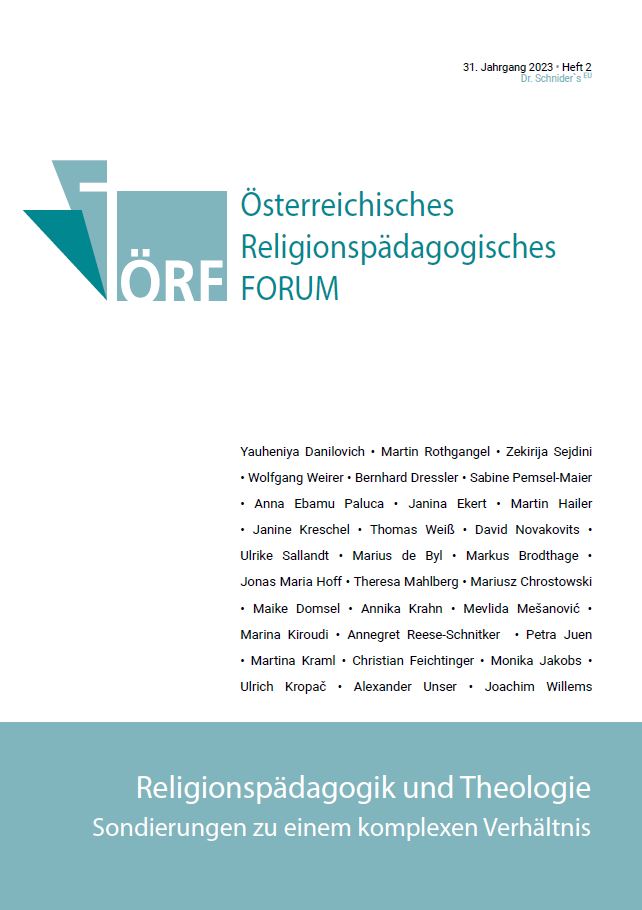
Religious Education and Theology. Explorations of a complex relationship
Vol. 31 No. 2 (2023)In the German-speaking world, religious education is usually understood as a sub-discipline of theology. This is by no means a matter of course, because internationally, in some countries such as England, "religious studies" has taken the place of theology. Without considering theology and religious studies as mutually exclusive alternatives, it seems obvious that in countries with denominational religious education, theology plays an essential role as a reference discipline of religious education, while in countries with non-denominational religious education, religious studies takes its place. However, even then the question arises as to how the relationship between theology and religious education is to be defined in more detail.
-
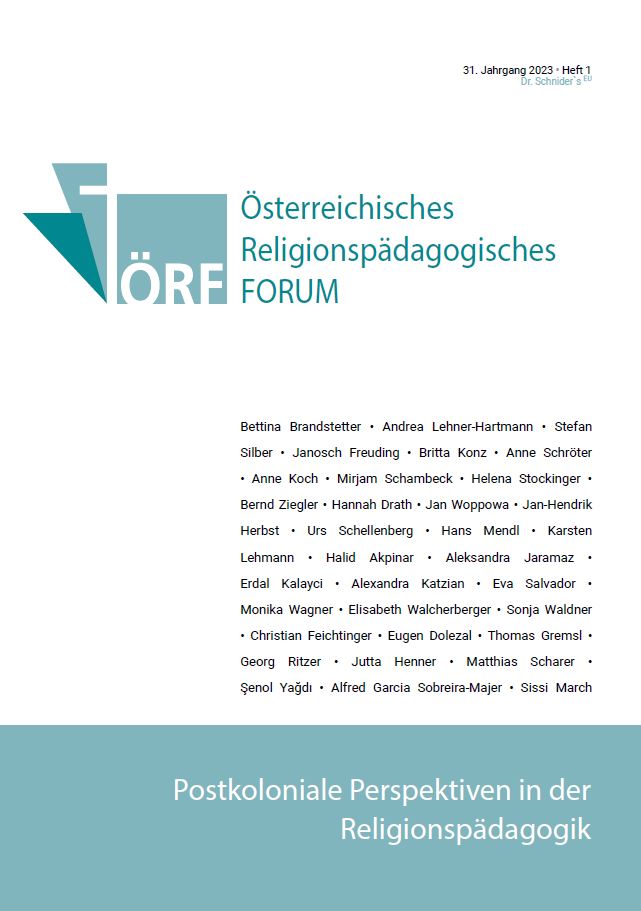
Postcolonial Perspectives in Religious Education
Vol. 31 No. 1 (2023)Postcolonial studies and theories offer a toolkit to deconstruct powerful bodies of knowledge and practices, to reformulate alternative forms of knowledge and to enable resistant processes of negotiation. For about two decades they have been received in different theological sub-disciplines. In this issue we want to shed light on the reception of postcolonial studies and theories in religious education as well as their contribution to religious education and their limitations.
-
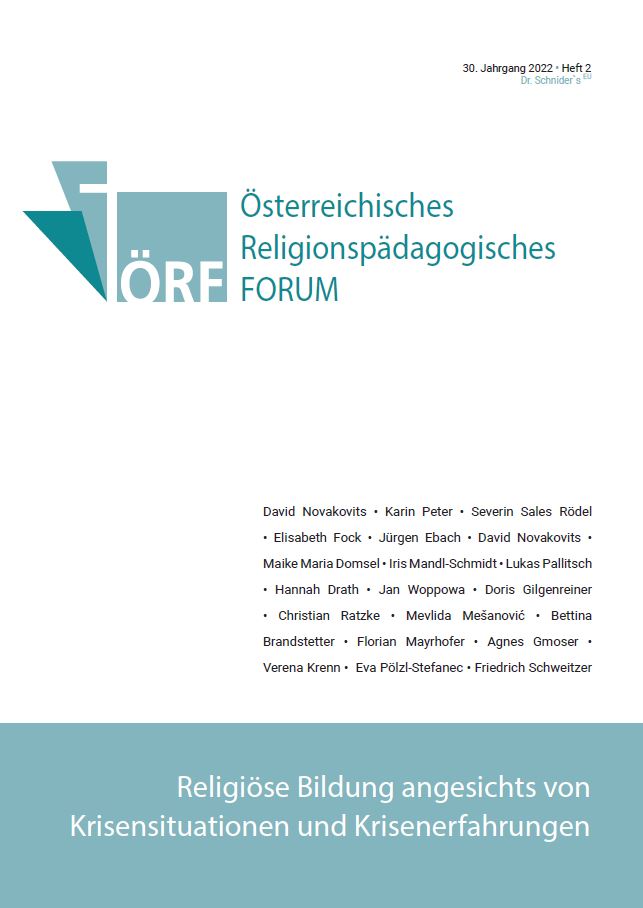
Religious education in the light of crisis situations and experiences
Vol. 30 No. 2 (2022)Religious education in the light of crises situations and experiences
On the one hand, experiences of crisis represent a constant of every human life and every time, on the other hand, they seem to have become more concentrated in recent times. Accordingly, in recent years religious education has been increasingly confronted with the effects of multiple crises on this side and beyond its professional boundaries. From the numerous systemic crises within church and religious institutions to the perception of the world as a wounded place of living together - the revelation of the crisis dimension of the present has moved into authoritative and important discourses of the religious education landscape and is increasingly shaping the religious education consciousness of our time.
-

Ethics Education and Religious Education
Vol. 30 No. 1 (2022)This issue of the “ÖRF” focusses on the relationship between the school subjects of ethics and religion and how the introduction of ethics classes will affect religious education and its didactics as well as the training of teachers for religious education and for ethics. This includes the analysis of public debates, empirical studies, and evaluations as well as didactic concepts and reflections.
-
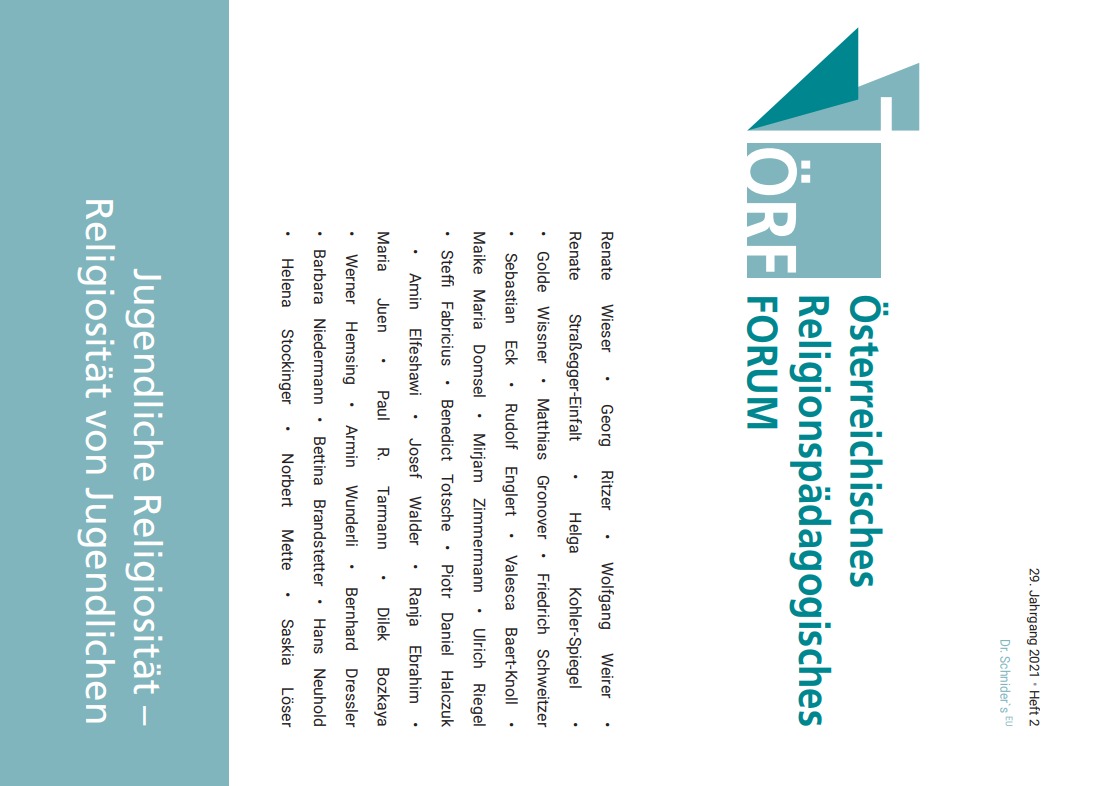
Youth Religiousness - Religiousness of Youth
Vol. 29 No. 2 (2021)The preoccupation “with the scientific reflection and orientation of religious learning processes” (Bitter/Englert/Nipkow) is a core topic of religious education studies. Therefore, the importance of the examination of the religiosity of persons – young and old – for religious education studies is obvious. The 2/2021 issue of the “ÖRF” now focuses on the religiosity of young people – a topic that has been challenging in religious education studies again and again, since young people are considered as a sort of “seismographs” for the current “constitution of religion” (Schenker). Accordingly, both theoretical and empirical research of young people’s religiosity have a long tradition in religious education studies. Consequently, there is a wealth of relevant knowledge and methodological considerations. Nevertheless, there are still desiderata for research.
-
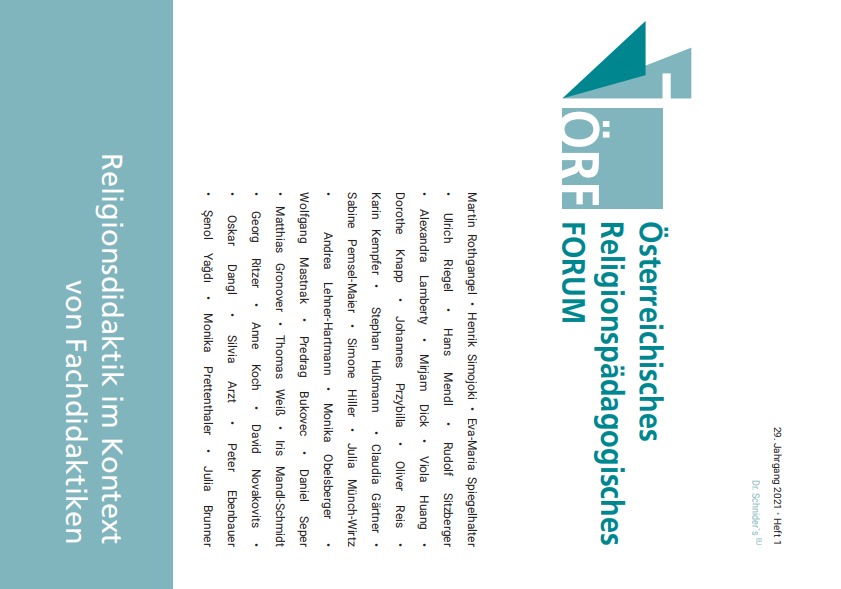
Didactics of religion in the context of subject didactics
Vol. 29 No. 1 (2021)In the last 20 years, the discussion between subject didactics has intensified enormously. The formation of subject didactics umbrella organizations such as the GFD in Germany, the ÖGFD in Austria and KOFADIS in Switzerland have contributed to this, but also the increasing cooperation of subject didactics in various research projects. In addition, the formation of Centers for Teacher Education or Schools of Education support the interweaving of subject didactics, subject sciences, educational sciences and practice. It is also striking that - partly due to the lack of reception of more recent subject didactic developments in general didactics - a general subject didactics has been established (Bayrhuber et al. 2017; Rothgangel et al. 2020). By conducting a comparison of subject didactics that focuses on similarities as well as differences, general subject didactics can in turn generate impulses for the conversation within and between subject didactics.
Translated with www.DeepL.com/Translator (free version)
-
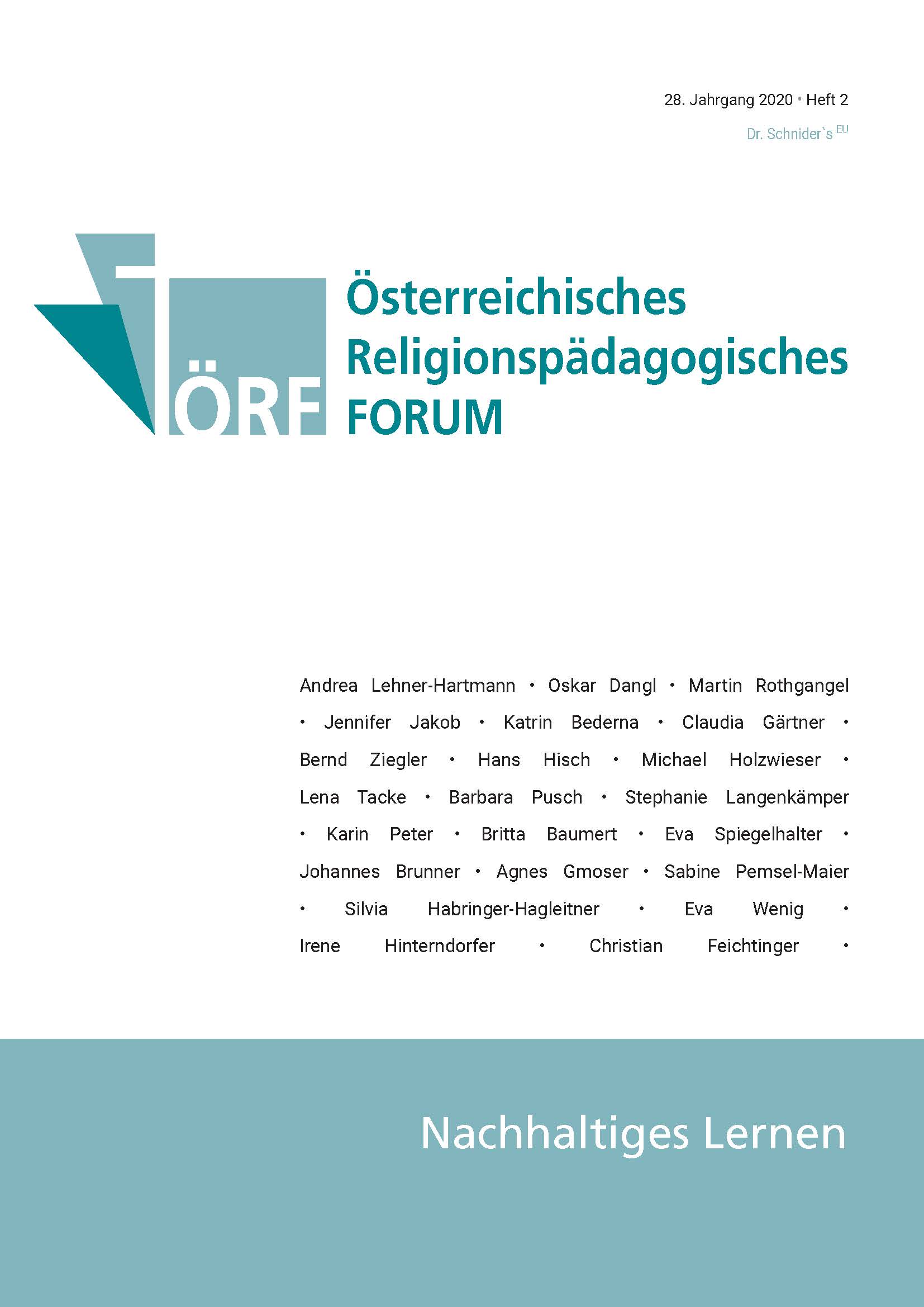
Nachhaltiges Lernen
Vol. 28 No. 2 (2020)Österreichisches Religionspädagogisches Forum 28 / 2020 / Heft 2
„Nachhaltiges Lernen“
In der Religionspädagogik kommen – einige engagierte Personen und Einzelprojekte ausgenommen – erst langsam systematische Überlegungen zum Umgang mit Umweltkrisen in Schwung. Vielleicht geschieht dies aufgrund der Einsicht, dass Schöpfung und Natur nicht einfach gleichzusetzen sind, oder aufgrund der Sorge, dass entsprechende religionsunterrichtliche Initiativen als religiöse Moralisierung (miss-)verstanden werden können. Gleichwohl rechtfertigt dies nicht die weitgehende Vernachlässigung des Nachhaltigen Lernens in der Religionspädagogik. Das vorliegende Heft will diese Hürden überwinden und einen Diskurs, der in anderen Bereichen bereits intensiv betrieben wird, aufgreifen und unter religionspädagogischer Perspektive weiterführen.
-
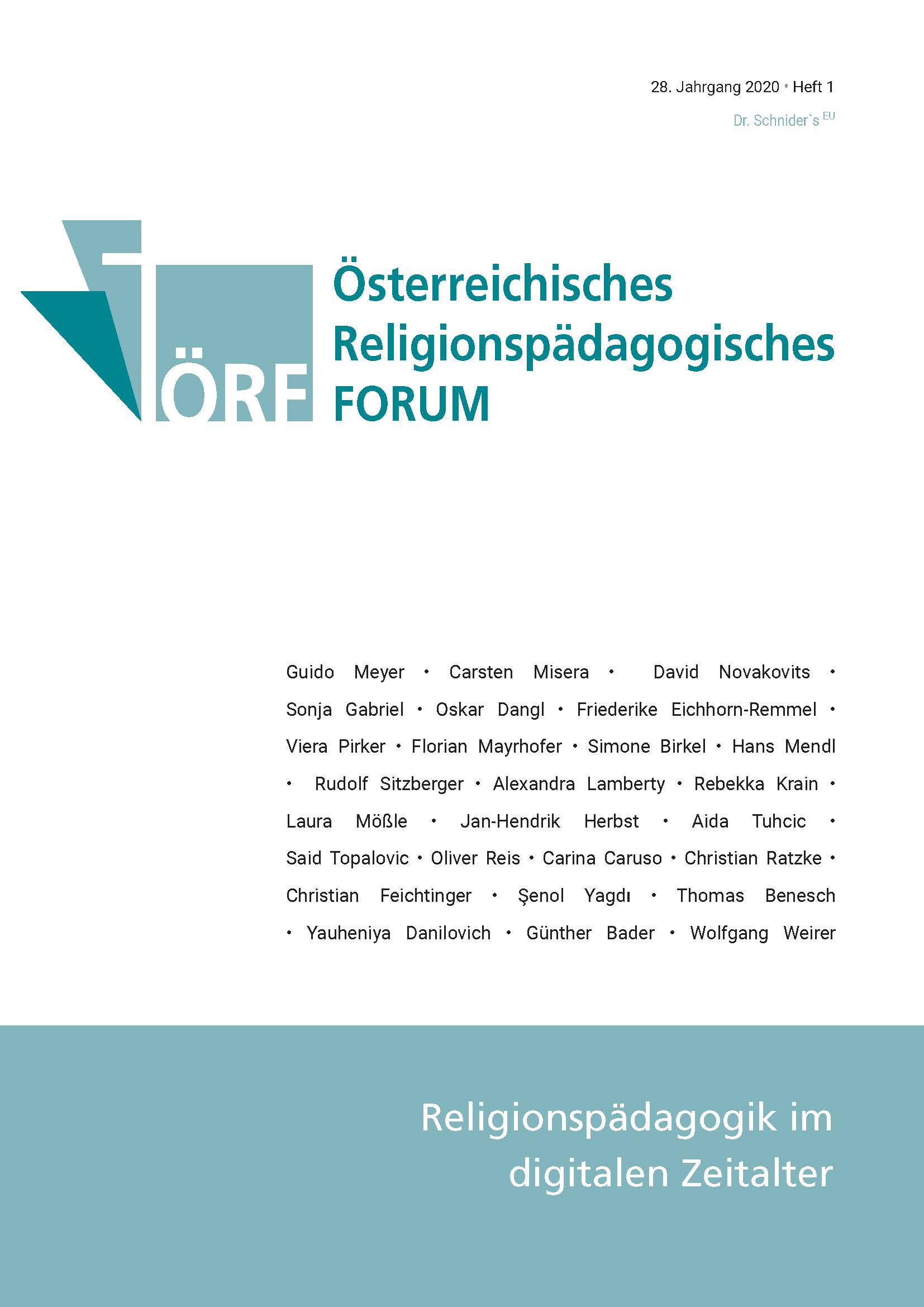
Religious Education in the digital age
Vol. 28 No. 1 (2020)Digital education, open educational ressources, learning apps, inverted classroom, paperfree lessons, TablettClass, SAMR model: Such slogans reflect the level of change through digital transformation in schools, teaching, learning and teaching. Major differences occur, comparing regions and schools, such as technical equipment at various locations, legal framework and skills of teachers. The generation gap is flagrant. Not only schools, but the educational landscape in general are shifting significantly in these processes. In many universities, professorships and focal points are being set up for digitization, digital transformation, digital humanities. Religious Education in the digital age has to react and rebuild its own frameworks.
Educational people - teachers as well as learners - need to build digital skills for handling these challenges, which can be structured into different areas: technologies, teaching and learning, communication and networking, innovating and creating, searching and using, identity and well-being.
The digital transformation completes and accelerates the mediatization of the lifeworld. In the meantime, it has created new realities in school and education. Religious Education has to embed them in broad discourses on digital religion, in the wider context of religion and the media, as well as questions of symbolism, religious visuality and communication, in learning theories and teaching concepts.
-
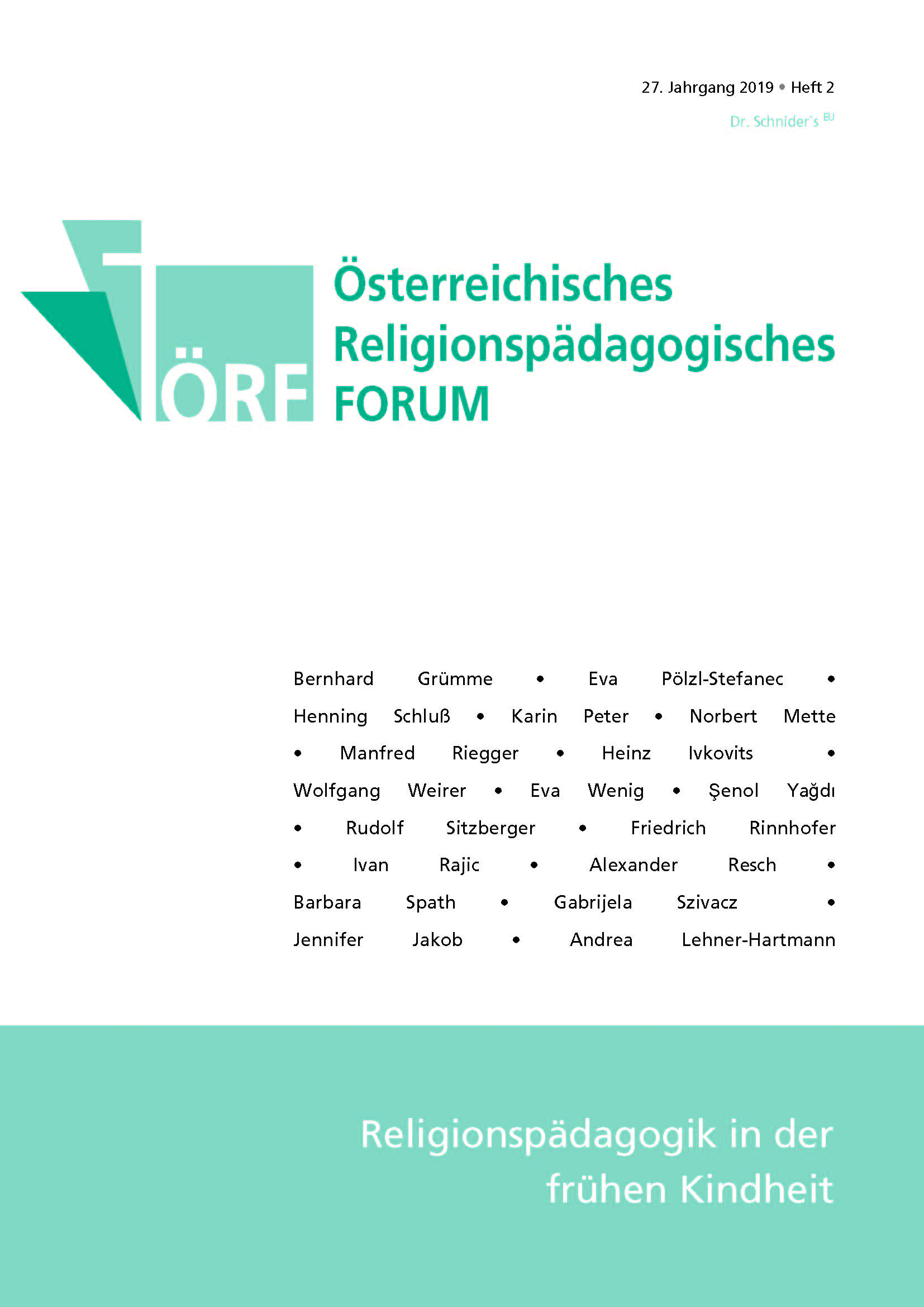
Religionspädagogik in der frühen Kindheit
Vol. 27 No. 2 (2019)Die Frage nach Religion in der frühen Kindheit erfährt gegenwärtig in pädagogischen, medialen und gesellschaftspolitischen Diskursen neue Aufmerksamkeit, was einerseits als Zeichen für eine positive Entwicklung gedeutet werden kann, andererseits einer kritischen Beobachtung und Reflexion seitens der Religionspädagogik bedarf. Die Auseinandersetzungen verlaufen kontrovers: Wurde die Frage nach religiöser Bildung im Österreichischen BildungsRahmenPlan für Elementarpädagogische Bildungseinrichtungen 2009 noch ausgeblendet, so erhielt sie nicht zuletzt durch die Debatte um die sogenannten ‚islamischen Kindergärten’, einen Ethikleitfaden der Stadt Wien sowie in der Diskussion um ein Kopftuchverbot in Kindergärten und einen Wertekatalog als ‚bundesländer-übergreifender und verpflichtender Leitfaden’ in Österreich neue Brisanz. Zugleich wird Religion als Quelle für eine spirituell-religiöse Identitätsentwicklung, als Ressource für Kinder mit Fluchterfahrungen und als Brücke in der Begegnung einander fremder Menschen angesehen. Solche Diskurse greifen auf unterschiedliche Felder frühkindlicher Entwicklung zu, vor allem auf elementarpädagogische Bildungseinrichtungen. Sie lösen zum einen Ängste und Unsicherheiten aus, bringen aber auch ein Bedürfnis nach Orientierung, Bildung und Reflexion der eigenen Praxis hervor. ElementarpädagogInnen sind insbesondere vor die Herausforderung gestellt, wie sie die Vielfalt an Weltanschauungen und religiösen Prägungen, aber auch religiöse Distanzierung in ihrem Berufsalltag vereinen können, der nach wie vor stark vom Ablauf des christlichen Kirchenjahres geprägt ist. Zugleich stehen mediale und gesellschaftspolitische Ansprüche einer Identitätspolitik im Raum, die eine Trennlinie zwischen ‚Wir’ und den ‚Anderen’ forciert. Kein Wunder also, dass dieses Konglomerat eine Vielzahl an Umgangsweisen mit Religion(en) hervorbringt, die einer verstärkten Reflexion und konzeptionellen Bearbeitung bedarf. Dabei ist die frühe Kindheit längst nicht mehr als bloße Adressatin (religions)pädagogischer Überlegungen anzusehen, sondern als eine Quelle für gesellschaftspolitisch relevante Praxis und als eine Fundstelle für theologische Erkenntnis.
-
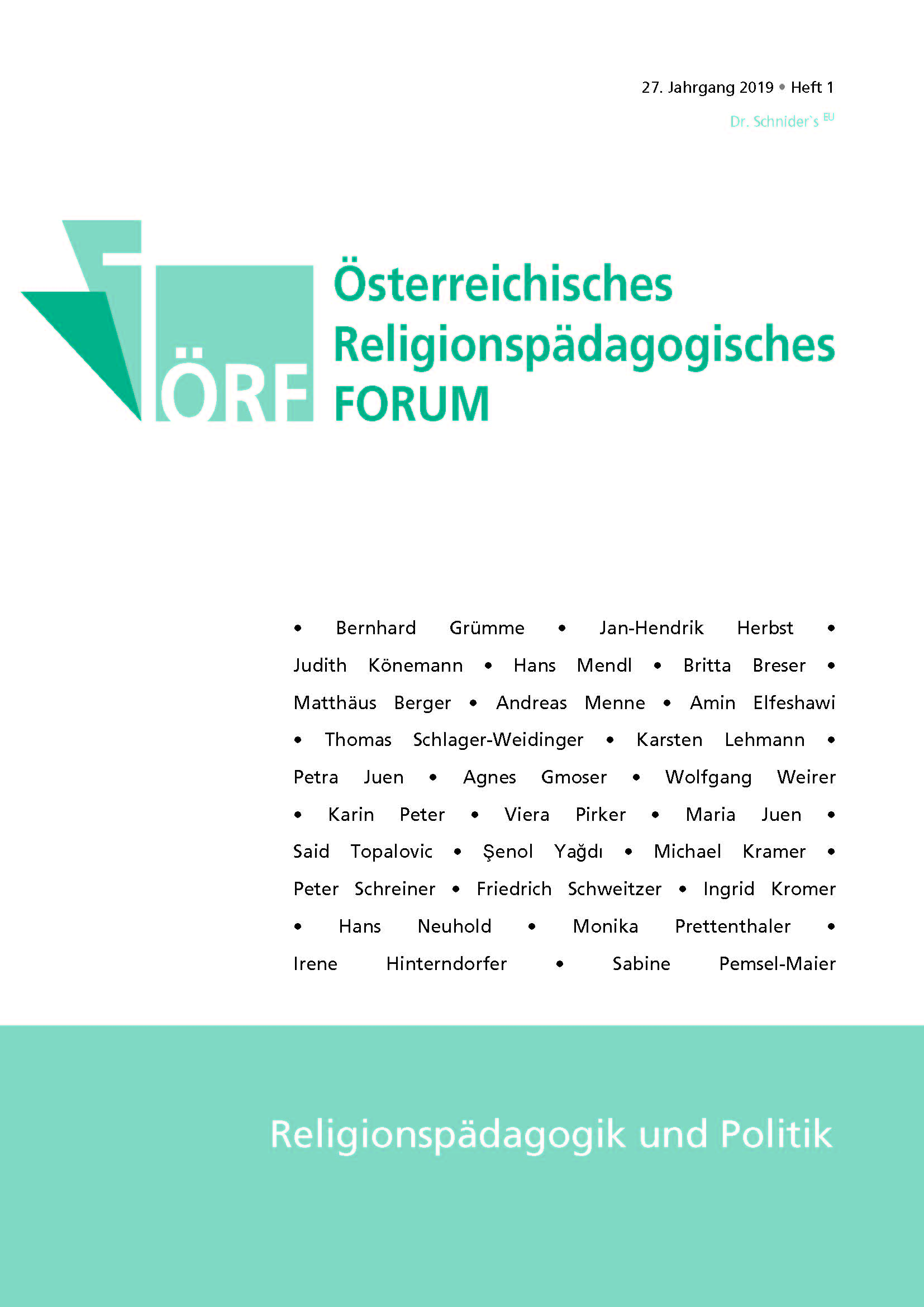
Religious education and politics
Vol. 27 No. 1 (2019)The relationship between religion and politics is a key question of modern state conception. Interrelation between religious education and politics must be reflected in this context. A large part of religious education in the German-speaking world is governed by public law, and thus is part of political processes and decisions, such as religious education in public schools, theological faculties at public universities or the state recognition of private religious education institutions. A trend towards the legitimation of religious education in public schools was made visible on the basis of the considerations of the polity, for example when religious education at schools is supported by the argument of fundamentalism prevention. Thus the discussion about confessional kindergartens also raises the question of how the state should legitimize and regulate religious institutions (both public and non-public). Directly affected are also issues of religious freedom and tolerance. Religious education in schools and religious education itself have an immanent political task: Religions are part of the civil society and participate in political discourses. Political issues such as justice, poverty or peace are the same time concerns and questions of the religions. Therefore the question arises whether and in what way religious education must be able to participate in these civil society processes, which is also an issue of the formation of democracy. In short: How politically must religious education at schools be, when religions are part of public political life? It is also necessary to clarify wheter in day-to-day political questions are addressed in religious education processes and if religious educators should be politically positioned. In the light of the fact that members of religions are to be found throughout the political spectrum and that there is no consistency between religiosity and a certain political position. This involves both a fundamental, theoretical positioning of a scientific pedagogy of religion as well as concrete educational processes in schools, universities and municipalities, which point to a “political intended religious pedagogy” (Rickerts).
-
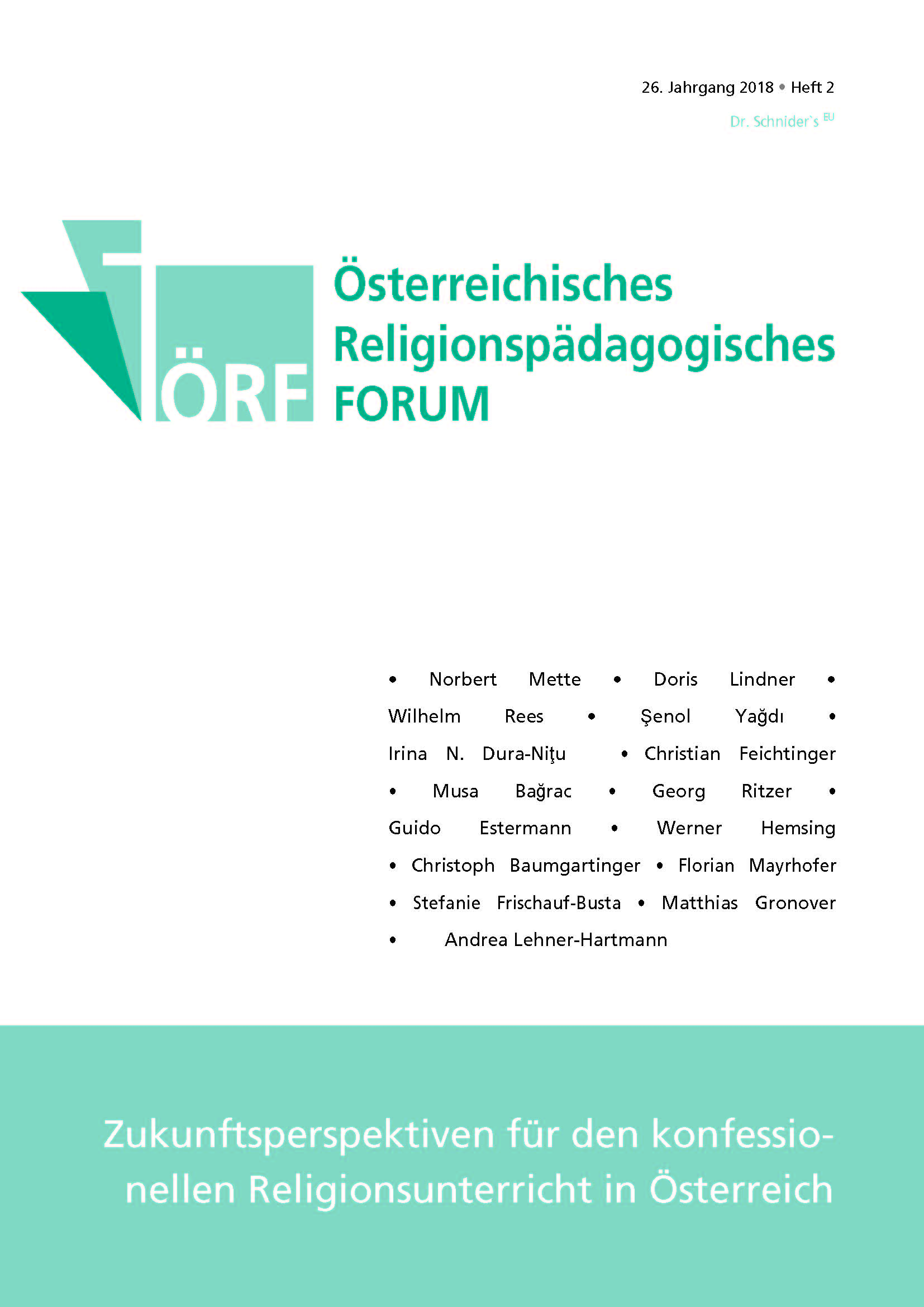
Future perspectives for confessional religious education in Austria
Vol. 26 No. 2 (2018)In recent years cultural and religious diversity has increased, especially in Europe. Migration and refugee crisis have contributed significantly to this situation. This changed many things in society and in particular the access and attitude to religion. New conflicts arise between certain ideas of religion and secularity. This is also reflected in religious education. The increase or decrease of student numbers results in new realities, which are not sufficiently taken into account by the present conceptions of religious education because these have emerged in a different context. On this background the content, orientations and legal frameworks of religious education are becoming more and more important for the future. Solution must be developed in collaboration with religious communities, religious educators and school authorities.
In this context the following questions arise: What are the challenges for religious education from the current context?
Is confessional religious education in Austria a viable model?
Which legal framework is necessary for an innovative development?
How could confessionalism be re-understood in the face of the new realities?
What future-oriented models of religious education in schools have already been developed or are being developed? How is the relationship between confessionalism and forms of cross-confessional and interreligious cooperation in religious education?
What do these challenges and questions mean for the University education of religious teachers?

